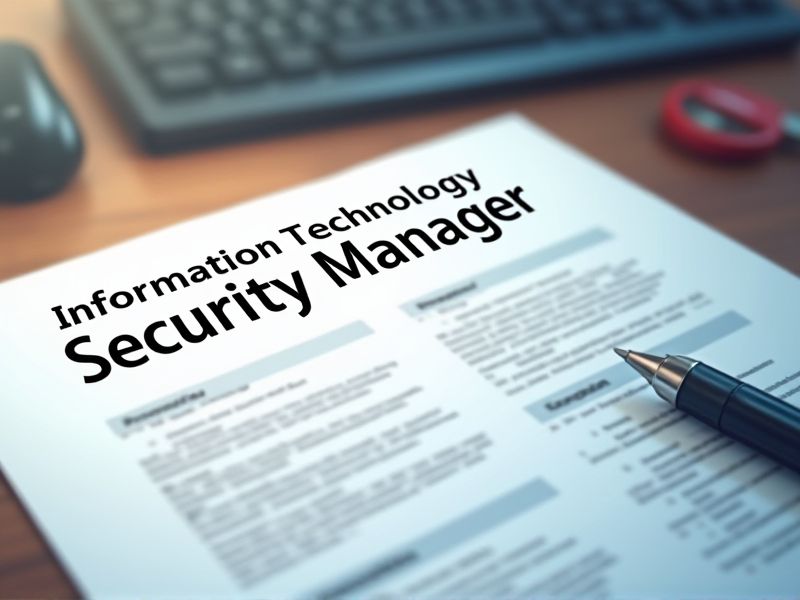
In today's digital landscape, the role of an Information Technology Security Manager is critical in safeguarding sensitive data and systems from cyber threats. Possessing specific certifications enhances credibility, equipping managers with the necessary skills to tackle complex security challenges. These credentials validate knowledge and assure organizations of an individual's proficiency in implementing robust security measures. Here are some certifications that are important for an aspiring Information Technology Security Manager.
Certified Information Systems Security Professional (CISSP)
CISSP certification establishes a baseline of competence, ensuring IT Security Managers possess fundamental knowledge in information security principles. Employers recognize CISSP as a globally acknowledged standard, which can increase credibility and job prospects. The certification provides IT Security Managers with access to an extensive community, enabling knowledge sharing and staying updated on evolving security threats. CISSP's comprehensive curriculum ensures managers understand technical aspects and risk management, critical for effectively securing organizational assets.
Certified Information Security Manager (CISM)
Organizations face growing cybersecurity threats, leading to an increased emphasis on establishing robust security frameworks, a need addressed by a Certified Information Security Manager (CISM). A CISM credential emphasizes strategic alignment between IT security measures and business objectives, enhancing decision-making and risk management. The certification signifies an individual's proficiency in designing and managing enterprise information security programs, crucial for leadership roles. In the competitive IT sector, possessing a CISM designation can potentially facilitate career advancement and elevate professional credibility.
Certified Information Systems Auditor (CISA)
The role of a Certified Information Systems Auditor (CISA) in an IT Security Manager position ensures adherence to global security standards, which enhances the organization's trustworthiness and compliance. Earning CISA certification equips managers with essential auditing skills to identify security vulnerabilities and assess the effectiveness of IT controls. This certification also signals a high level of expertise, instilling confidence among stakeholders regarding the organization's cybersecurity stance. Organizations often experience improved incident response and risk management when security managers possess CISA credentials, leading to a fortified IT infrastructure.
Certified in Risk and Information Systems Control (CRISC)
CRISC certification provides IT Security Managers with the skills to identify and manage operational and financial risks. Organizations increasingly face complex IT environments, making risk management a critical component of business strategy. Holding a CRISC certification signals proficiency in these areas, enhancing decision-making capabilities concerning risk and information systems. Improved risk management processes can lead to enhanced organizational security and a stronger alignment with business goals.
CompTIA Security+
CompTIA Security+ provides a foundation in essential security concepts critical for an Information Technology Security Manager's role, enhancing their ability to protect an organization's assets. Employers often require this certification since it demonstrates a recognized standard of knowledge and understanding in cybersecurity practices. With skills validated by Security+, an IT Security Manager is better equipped to develop and implement effective security policies. The certification also covers risk management and mitigation, key areas that an IT Security Manager must address to safeguard information systems.
Certified Ethical Hacker (CEH)
The growing sophistication of cyber threats increases the necessity for Information Technology Security Managers to possess Certified Ethical Hacker (CEH) certification, which provides practical knowledge in understanding and countering these threats. A CEH certification equips managers with the skills to think like a hacker, enabling them to anticipate and mitigate security breaches effectively. Organizations value CEH-certified professionals for their ability to identify and address vulnerabilities that standard security measures may overlook. The certification also demonstrates a commitment to ongoing professional development, maintaining an organization's trust in its cybersecurity leadership.
GIAC Security Leadership Certification (GSLC)
The GIAC Security Leadership Certification (GSLC) provides comprehensive knowledge critical for IT Security Managers to effectively lead and manage security teams. Possessing GSLC certification signifies proficiency in essential areas such as risk management, incident response, and governance, which are central to safeguarding organizational data. IT Security Managers with GSLC credentials are often preferred by employers due to their validated expertise that aligns with industry standards. This certification enhances leadership capabilities, promoting robust security strategy implementation within organizations.
ISO/IEC 27001 Lead Implementer
An ISO/IEC 27001 Lead Implementer provides the essential expertise needed to establish and manage an information security management system, ensuring systematic risk identification and management. This credential helps align the organization's information security practices with global standards, reducing vulnerabilities and enhancing data protection. With this certification, an Information Technology Security Manager can drive compliance efforts, facilitating smoother regulatory audits. It also equips them with the skills to efficiently handle security incidents, ensuring effective mitigation and continuity strategies.
CompTIA Advanced Security Practitioner (CASP+)
The CompTIA Advanced Security Practitioner (CASP+) certification equips Information Technology Security Managers with advanced skills required for managing enterprise-wide security. It addresses critical issues such as risk management, enterprise security operations, and architecture, which are pivotal in strategic decision-making. The CASP+ certification covers practical scenarios and hands-on experience, fostering a deep understanding to handle complex security threats effectively. Given the increasing sophistication of cyber threats, possessing CASP+ validates an IT professional's ability to implement secure enterprise environments efficiently.
Project Management Professional (PMP)
The Project Management Professional (PMP) certification provides IT Security Managers with a structured approach to managing complex security projects, ensuring they meet objectives within scope, time, and budget. Enhanced project management skills lead to better alignment of security initiatives with organizational goals, thereby reducing vulnerabilities. PMP certification equips managers with a universal language and methodology, facilitating clearer communication and collaboration across cross-functional teams. Improved risk management techniques gained from PMP enable security managers to identify, assess, and mitigate potential threats more effectively.
Summary
By obtaining certifications, you enhance your expertise in information security protocols. This increased knowledge enables you to implement stronger protective measures for organizational data. Your credentials boost your professional credibility, likely leading to increased trust and respect from colleagues. Organizations often see a decrease in security breaches and a more robust defense posture as a direct result.
